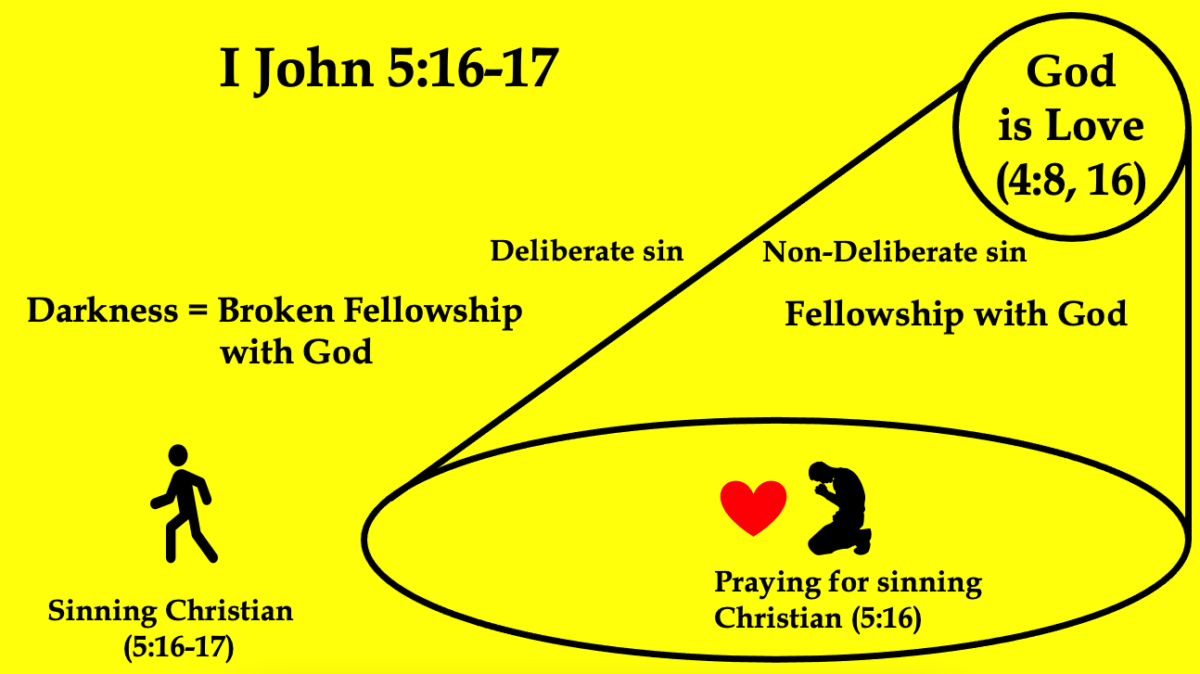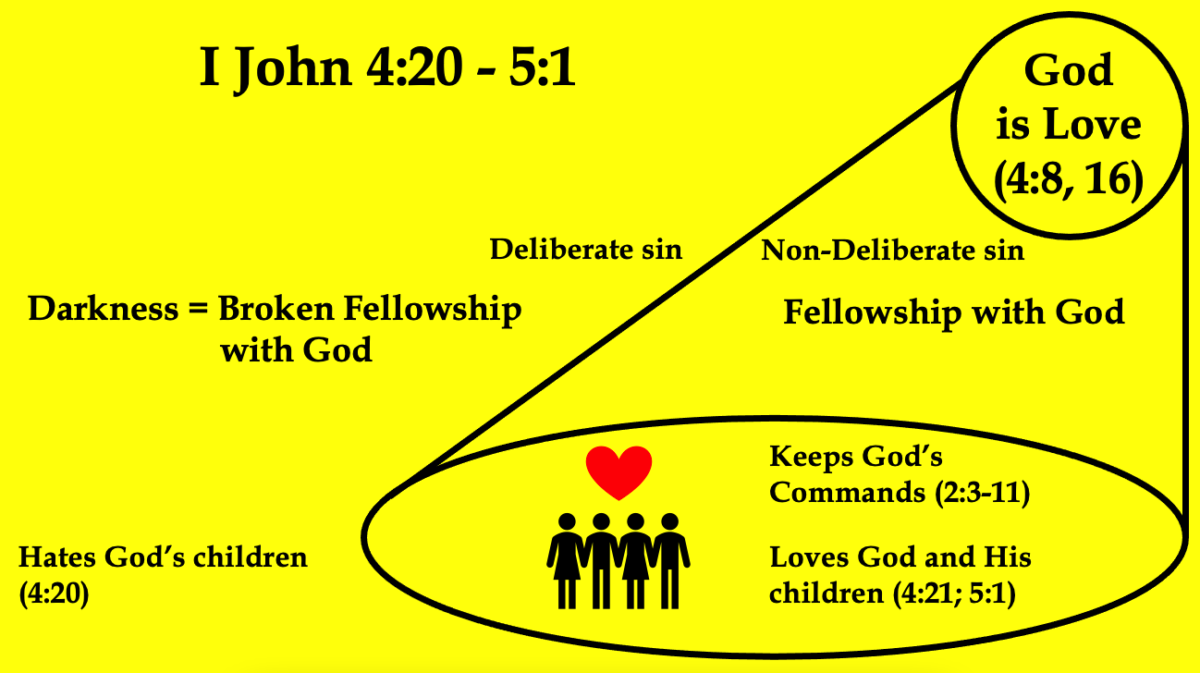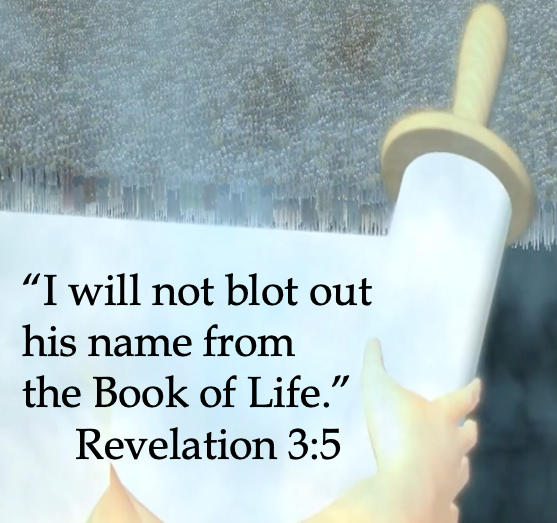“If anyone sees his brother sinning a sin which does not lead to death, he will ask, and He will give him life for those who commit sin not leading to death. There is sin leading to death. I do not say that he should pray about that.” I John 5:16
As the apostle John approached the end of his letter, he resumed talking about prayer that expresses faith in the name of God’s Son (I John 5:13b -15). John spoke of praying for our own needs especially as it relates to God’s will which is revealed in His commandments. God has commanded us to love one another (I John 3:11, 23; 4:7, 11-12; cf. John 13:34-35). When we ask God to help us do this, we can be confident He hears this request favorably because we know this is according to His revealed will (5:14-15).
But John does not want us to stop with praying for our own needs (5:14-15), he also wants us to pray for the needs of others (5:16-17). When other Christians love us, we may not see our need to ask God for help to love them back. But when a Christian sins against us we may recognize our need for God’s help. Jesus taught that praying for someone who has sinned against us is an act of love (cf. Matt. 5:44). 1
Hence, John writes, “If anyone sees his brother sinning a sin which does not lead to death, he will ask, and He will give him life for those who commit sin not leading to death. There is sin leading to death. I do not say that he should pray about that.” (I John 5:16). We can pray with confidence for a “brother sinning a sin which does not lead to death” that God will answer our prayer favorably. God will give us “life” to give to our brothers “who commit sin not leading to death” (5:16a). 2
Hence, “the name of the Son of God” (5:13b) becomes “life” “for the sinning believer who gets a longer life plus joy when he repents and for the praying brother when he receives a positive answer for his prayer. We get joy from answered prayer, and the sinning brother gets restored joy when he returns to fellowship (and potentially a longer life).” 3
“John offers a specific example of confident prayer that is according to God’s will and that involves a horizontal expression of love. If you see a brother committing a sin, he needs a believer who is intimate with God to intercede for him (5:16). As a result of his own intimacy intimacy with God, Moses intervened on behalf of Israel (Exod. 32:7-14). When the four men who carried the paralytic took him to Jesus, He forgave and healed when He saw their faith (Mark 2:5). When we reach out in love to a brother or sister who is being defeated, God can allow that believer to piggyback on our faith to receive deliverance. That’s what the family of God is about.” 4
However, this promise does not apply to Christians who commit sin leading directly or immediately to a premature physical death. 5 John writes, “There is sin leading to death. I do not say that he should pray about that.” (5:16b). A Christian brother is not encouraged to pray for another believer who is committing a sin that leads immediately to a swift physical death. Nor is he instructed not to pray for him.
“In other words, if a Christian suspects that a sin leading directly to death is being committed, he is free to pray for the sinning believer, but without any certainty about the outcome of his prayer. Although there is no guarantee, it is always possible that God may ‘relent’ from His judgment.” 6
“All unrighteousness is sin, and there is sin not leading to death.” (I John 5:17). All “unrighteousness” (adikia) or wrongdoing in God’s eyes “is sin” but out of this broad spectrum “there is sin not leading to death.” This last phrase sin “not leading to death” (mē pros thanaton/ou pros thanaton) occurs three times in 5:16-17 and should be understood to mean “not punished by death.” 7
The distinction in I John 5:16-17 is between sins for which death is a rapid consequence and sins for which it is not. Obviously, all Christians still sin (I John 1:8, 10). But God makes a distinction between sins that result in premature death and those that do not such as envy, lying, slander, gossip, pride, manipulation, anger, deception, lust, or hypocrisy. 8
This is also not a reference to eternal “death” as some teach. 9 John is speaking here of a believer’s Christian “brother” who has eternal life which can never be lost (5:1, 13; cf. John 6:35-30; 10:28-29).
Examples of sin leading to a premature or swift physical death among Christians is seen in Acts 5:1-11 and I Corinthians 3:16-17; 5:5; 11:30. 10 Ananias and Sapphira “lied … to God” the Holy Spirit about the amount of money they obtained when they sold their property and gave only “part” of the proceeds to the apostles to distribute to other believers (Acts 4:34-5:4). They wanted God and other believers to think they were more generous than they actually were. As a result of not allowing the Holy Spirit to control them, both Ananias and Sapphira “immediately” died (Acts 5:5-10).
The Christians at Corinth also committed sins which could lead to premature death. These included:
- Exalting God’s servants instead of God will “destroy” (phtheiro) or “defile” the local church (“you” = plural) which is “the temple of God” in whom “the Spirit of God dwells” (I Cor. 3:16-17). Bringing harm to the local church through illegitimate divisions or false doctrine could result in a premature physical death. 11
- Continuing in sexual immorality as a Corinthian believer did with “his father’s wife” (I Cor. 5:1) or the sinning believer’s stepmother. Paul instructed the church to “deliver such a one to Satan” by excommunicating him from the church so God’s protective covering is removed from his life. 12 Then Satan can use the world which he controls (John 12:31; 16:11; 2 Cor. 4:4; Eph. 2:12; Col. 1:13; 1 John 5:19) 13 “for the destruction of the flesh” of this wayward believer so “that his spirit may be saved in the day of the Lord Jesus” (I Cor. 5:5). The word “flesh” is not likely to refer to the man’s sinful desires because Satan is not likely to destroy them. It is better to understand the “flesh” to be his physical life which when destroyed would “save” this Christian from the additional loss of eternal rewards before he faces Jesus at the Judgment Seat (cf. I Cor. 3:8-15). A similar view is that the word “save” (sōzō) is often used in the New Testament to mean being healed or being healthy (cf. Matt. 9:21-22; Mark 5:23, 28, 34; 6:56; 10:52; Luke 7:50; 8:36, 48, 50; 17:19; 18:42; Acts 4:9; 14:9; Jas. 5:15). According to this view, Paul’s desire is that this man’s spirit will be healthy in the day of the Lord Jesus through his repentant response to church discipline. 14 “The day of the Lord Jesus” is a reference to the Judgment Seat of Christ (cf. I Cor. 1:8; 3:13; 2 Cor. 5:10; Phil. 2:16; 2 Thess. 2:2). 15
- The misuse of the Lord’s Supper to fulfill fleshly desires left “many” Corinthian believers “weak and sick among you, and many sleep.” (I Cor. 11:30). The word “sleep” refers to physical death (cf. John 11:11-13).
God wants His children to take sin seriously. The Bible tells us that believers who take sin lightly are flirting with death:
Proverbs 10:27: “The fear of the Lord prolongs days, but the years of the wicked will be shortened.”
Proverbs 11:19: “As righteousness leads to life, so he who pursues evil pursues it to his own death.”
Proverbs 13:14: “The law of the wise is a fountain of life, to turn one away from the snares of death.”
Proverbs 19:16: “He who keeps the commandment keeps his soul, but he who is careless of his ways will die.”
All sin if practiced long and hard enough will lead to physical death (James 1:14-15). Believers who understand this will pray for their fellow Christians who are sinning (I John 5:16). James writes, “19 Brethren, if anyone among you wanders from the truth, and someone turns him back, 20 let him know that he who turns a sinner from the error of his way will save a soul from death and cover a multitude of sins.” (James 5:19-20). When Christians (“Brethren”) are aware of another believer (“anyone among you”) who “wanders from the truth” and “turns him back” primarily through prayer (cf. James 5:13-18), the one who prays saves the sinning believer’s “soul from death” (premature physical death) “and covers a multitude of sins.” This last phrase alludes to Proverbs 10:12 which says, “But love covers all sins.” There may have been a vast number of decisions and choices that led a particular believer away from the Lord. But with the sacrificial love of Christ, James says praying Christians can be used of God to provide a covering for past sins and lead an astray brother or sister to restoration. 16
James 5:19-20 is speaking as much to the Christian who prays as he is to the Christian who strays. Evans writes, “Some believers aid the spiritual regression of fellow Christians by assuming it’s none of their business. But if your child darted into the street in front of a car, would you say it’s none of your business? Of course not! Though many believers fail to comprehend their responsibility to the family of faith, your Christianity is real when you see a brother in Christ backsliding and act in love. You cannot be a passive Christian.” 17
I believe the apostle John would agree with this. While God gives us eternal life as a free gift the moment we believe in the name of the Son of God (cf. 5:1, 13), we who are believers can give extended physical “life” to sinning believers, in some cases, when we pray in the name of the Son of God to be merciful to them (5:16-17). 18
However, it is important to remember that if a believer hardens his or her heart and refuses to confess and forsake their sins, he or she cannot expect mercy from God. Proverbs 28:13 says, “He who covers his sins will not prosper, but whoever confesses and forsakes them will have mercy.” It never benefits a Christian to harden his heart and cover up or hide his sins. God’s promises that if a sinning believer “confesses and forsakes” his sins, he “will have mercy.”
One of the greatest ways we can show God’s love to a sinning believer is to pray for him or her that God would bring them to repentance so the joy of fellowship with God and other Christians can be restored. We might not know if God will judge the sinning believer with premature physical death. In such cases we can pray that God will bring His will to pass for them. 19
Prayer: O Father, forgive us for failing to take sin seriously in our own lives and in the lives of fellow believers in Jesus. It can be easy for us to justify our apathy or lack of love for a sinning Christian by telling ourselves it is none of our business. Thank You for reminding us that if we love You, we are also to love a sinning brother or sister in Christ by praying for them in the name of the Son of God so they can be given a longer life and greater joy when they repent and return to fellowship with You and other Christians. Even though we do not know if You will judge a sinning believer with a premature physical death, we can still pray that You will bring Your will to pass in their lives. Right now, we pray for so and so, that You would turn him from the error of his way and restore him to close fellowship with You and Your children. Have mercy on us all heavenly Father. Thank You for hearing our prayers. In the matchless name of Jesus Christ, we pray. Amen.
ENDNOTES:
1. David R. Anderson, Maximum Joy: I John – Relationship or Fellowship? (Grace Theology Press, 2013 Kindle Edition), pg. 253.
2. In the phrase “he will ask [aitēsei], and He will give [dōsei] him [auton] life” —the first “he” (singular)in the text is the antecedent to the “him” (singular)because the second “He” refers to God who answers the prayer, and “life” is given to “him” (singular) to pass on “to those” [toise – plural] who are committing sin that does not lead to death (Anderson, Maximum Joy, pg. 253).
3. Ibid.
4. Tony Evans, CSB Bibles by Holman, The Tony Evans Bible Commentary (B & H Publishing Group, Kindle Edition, 2019), pg. 2952.
5. Zane C. Hodges; Robert Wilkin; J. Bond; Gary Derickson; Brad Doskocil; Dwight Hunt; Shawn Leach; The Grace New Testament Commentary: Revised Edition (Grace Evangelical Society, Kindle Edition, 2019), pg. 604; Tom Constable, Dr. Constable’s Notes on I John, 2022 Edition, pg. 116;
6. Hodges, The Grace New Testament Commentary, pg. 604.
7. Zane C. Hodges, The Bible Knowledge Commentary Epistles and Prophecy, Editors John F. Walvoord and Roy B. Zuck (David C. Cook, 2018 Kindle Edition), Kindle Location 4095.
8. Anderson, Maximum Joy, pg. 253.
9. Constable, Dr. Constable’s Notes on I John, pp. 116-117, 119 cites Randall K. J. Tan, “Should We Pray for Straying Brethren? John’s Confidence in 1 John 5:16-17,” Journal of the Evangelical Theological Society, 45:4 (December 2002), pp. 599-609; Robert W. Yarbrough, 1—3 John, Baker Exegetical Commentary on the New Testament series (Grand Rapids: Baker Academic, 2008), pp. 306-313; Rudolf Schnachenburg, The Johannine Epistles, translated from the 7th ed. of Die Johannesbriefe (1984) by Reginald and Ilse Fuller (New York: Crossroad Publishing Co., 1992), pg. 249; and John R. W. Stott, The Epistles of John, Tyndale New Testament Commentaries series (Grand Rapids: Wm. B. Eerdmans Publishing Co., 1964), pp. 186-191.
10. Constable, Dr. Constable’s Notes on I John, pg. 116; Evans, The Tony Evans Bible Commentary, pp. 2952-2953; Hodges, The Grace New Testament Commentary, pg. 604; Hodges, The Bible Knowledge Commentary Epistles and Prophecy, Kindle Location 4092 to 4097; Anderson, Maximum Joy, pg. 253.
11. Evans, The Tony Evans Bible Commentary, pg. 2490.
12. Dwight Hunt, Robert Wilkin; J. Bond; Gary Derickson; Brad Doskocil; Zane Hodges; Shawn Leach; The Grace New Testament Commentary: Revised Edition (Grace Evangelical Society, Kindle Edition, 2019), pg. 357.
13. Ibid. pp. 355, 357.
14. Ibid., pg. 357.
15. Robert Wilkin, The Grace New Testament Commentary, pg. 469.
16. Evans, Evans, The Tony Evans Bible Commentary, pg. 2890.
17. Ibid., pp. 2889-2890.
18. Constable, Dr. Constable’s Notes on I John, pg. 121.
19. Ibid., pg. 118 cites Robert W. Cook, “Hamartiological Problems in First John,” Bibliotheca Sacra 123; 491 (July-September 1966), pp. 257-59; and Samuel C. Storms, Reaching God’s Ear (Wheaton: Tyndale House Publishers, 1988), pp. 241-53.






